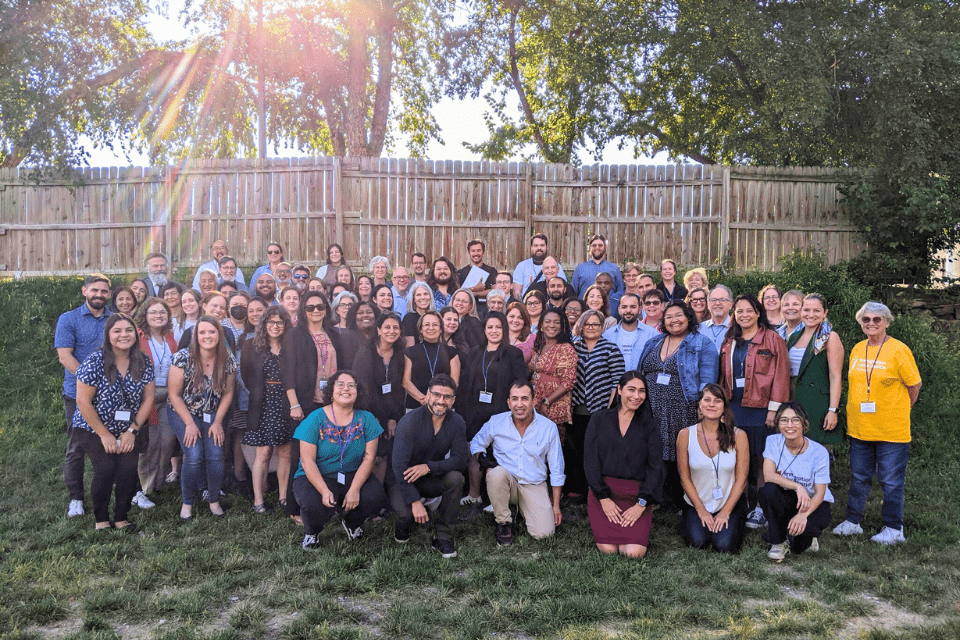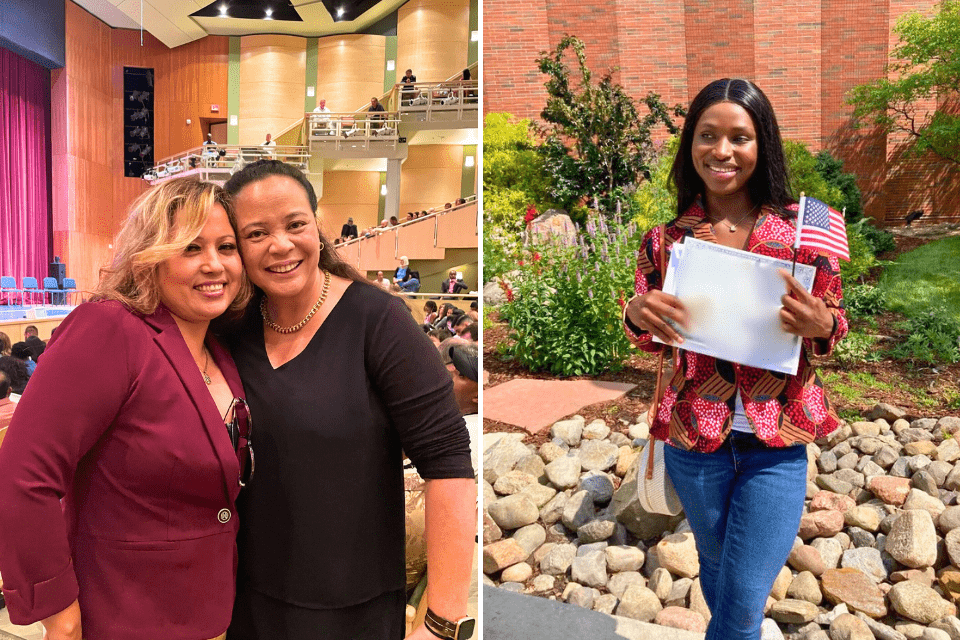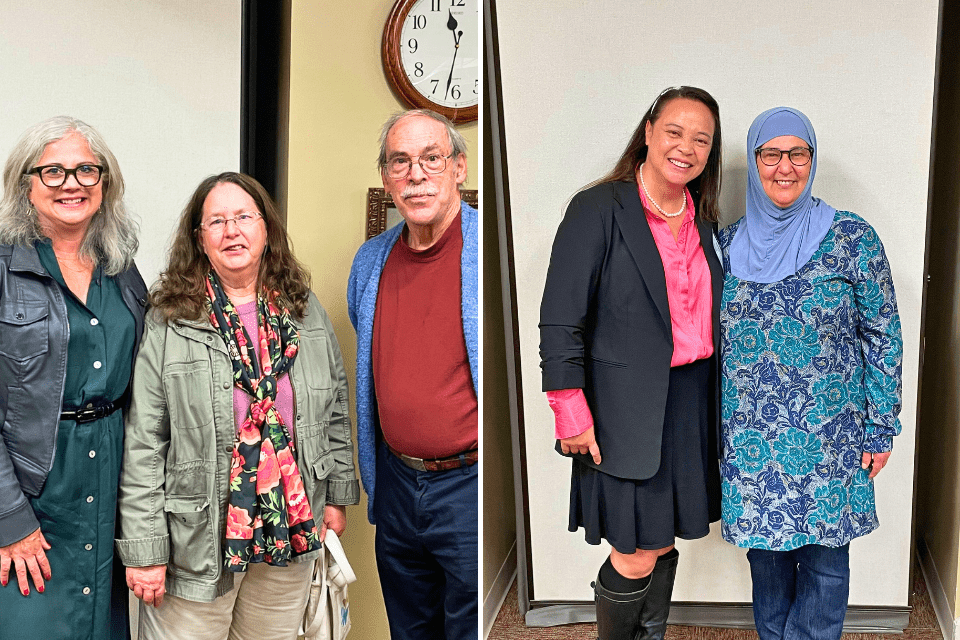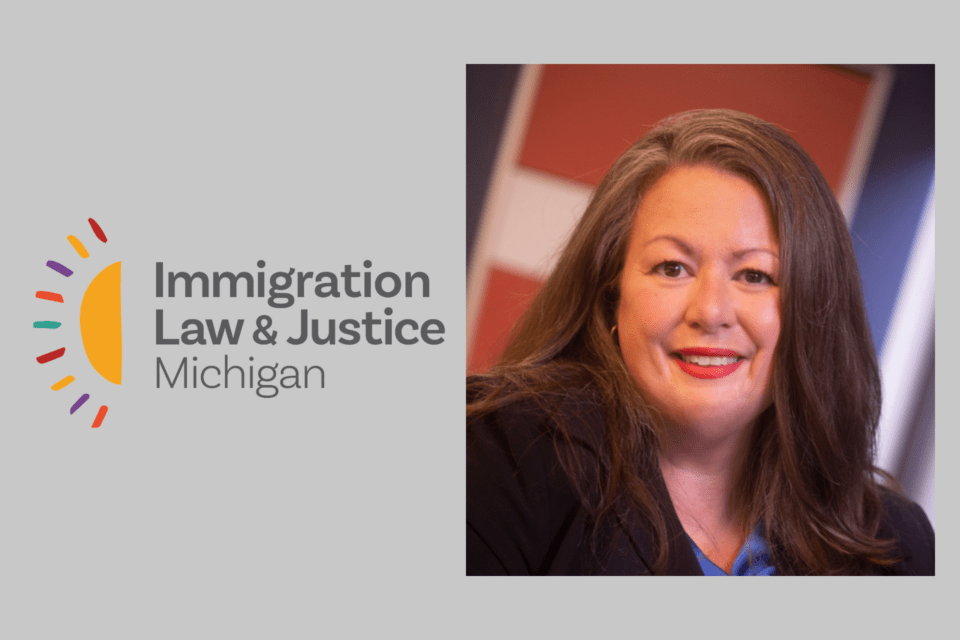At the helm of Immigration Law & Justice Michigan, Julie Powers gives thanks for the nonprofit’s United Methodist roots and casts a vision for 2025 and beyond.
JAMES DEATON
Content Editor
This year, Immigration Law & Justice Michigan (ILJ-MI), formerly Justice for Our Neighbors Michigan, celebrates 20 years of service to the state’s immigrant community. Members of First United Methodist Church of Grand Rapids opened the first ILJ-MI clinic providing free legal services to low-income immigrants in Michigan in 2004.
Today, there are four offices, with Kalamazoo, Dearborn (Metro Detroit), and Traverse City joining Grand Rapids. Each of the offices finds its home at a United Methodist church.
The Michigan Conference has supported ILJ-MI from its inception. ILJ-MI is an EngageMI Ministry Partner (CCMM#3013), financially uplifted by many United Methodist congregations through this mission engagement program. United Methodists also volunteer their time in various capacities as clinic hosts, translators, interpreters, and justice advocates.
ILJ-MI is part of a nationwide network of sites that grew out of the United Methodist Committee on Relief’s (UMCOR) commitment to refugees and immigrants. Refugee ministry has been a core tenet of UMCOR’s mission since it was founded in 1940 “to begin relief operations for the many refugee and internally displaced populations made destitute by World War II.”

Julie Powers, the new executive director of ILJ-MI, sat down with MIconnect to discuss her role, the organization’s vital ties to faith communities, and some thoughts on priorities for the coming year. Powers began in this new role on April 1, 2024. She has brought to ILJ-MI over 25 years of nonprofit leadership experience, including fund development and strategic planning.
In this interview, Powers thanks God for two decades of ministry and dreams about the future and what needs may be on the horizon for the immigrant community in Michigan.
As a person of faith, why is the work of ILJ-MI so important to you personally? What drew you to join the staff?
My faith as an Episcopalian grounds me in the belief that everyone is created in the image of God, that all of God’s people are deserving of dignity, compassion, and justice. When I started in the nonprofit sector in 1996 as part of Michigan Community Action, I realized I had found my life’s work — my people, if you will. My primary motivator is to find justice — for the environment, for immigrants, for the LGBTQ+ community, for economic security, and for community resilience. ILJ-MI is all of those things, all wrapped up in one organization. The team is smart, dedicated, funny, creative, and resilient. Once again, I’ve found my people.
What makes ILJ-MI a niche ministry? What would you like United Methodists in Michigan to know about your work?
ILJ-MI grew from the compassion and faith of United Methodist congregations, all of whom realized that immigrants and refugees deserve justice. We serve clients from 80+ countries who came to the United States in pursuit of a better, safer life. As an organization inspired by faith and focused on justice, we are compassionate, faithful, and just people doing the work that we are called to do. No one else provides the services we do for the immigrant community.
You work hard to fight disinformation. Name three “did-you-know” facts you’d like to share about immigrants here in Michigan.
6.9% (687,700 people) of Michigan’s population are immigrants. 7% of all Michigan residents have a parent who is an immigrant, so nearly 14% of the state’s population have a recent immigration story.
More immigrants come to Michigan from this country than all others. Can you name it? India.
Immigrants in Michigan pay $8.1 billion in taxes and have $23.1 billion in spending power. That’s a huge economic impact!

You’ve been at ILJ-MI for a few months now. What do you find encouraging about your current work? What is ILJ-MI doing well?
Home churches — Four United Methodist churches house our ILJ-MI offices — Traverse City: Central UMC, Grand Rapids: First UMC, Kalamazoo: First UMC, and Dearborn: First UMC. We serve nearly 1,000 clients annually, many of whom have escaped dangerous situations in their birth countries and are often anxious when they meet with us.
Our home churches have staff and volunteers who believe in and embrace radical hospitality. They are generous and kind hosts. From the moment they ring the bell, someone is there with a smile and sometimes a hug. When our staff are having tough days, there’s always a pot of coffee on and usually some pretty good pastries. While we are now a standalone nonprofit, we love being part of our home church families, and they treat us and our clients as such.
Immigration legal clinics — We are excited to resume hosting regular immigration legal clinics and joining with our partners, including faith communities, refugee resettlement agencies, libraries, schools, and more, to offer evening meetings to help clients complete their immigration paperwork. The COVID-19 pandemic stopped much of this work, so we’re glad to bring these services back.
ILJ-MI staff — Our team is small, but we are mighty! Our attorneys, Department of Justice representatives, and legal assistants are tough, smart, creative, and kind. They work so hard, and they are inspiring.
What are your priorities for 2025, and what new things are on the horizon?
Navigate federal immigration policy changes — Now that the election results are known, we are working to ensure that we can respond to what will likely be dramatic changes over the next few years. We will need to communicate this to our clients, past and present, and our partners.
Immigration legal clinics — As I mentioned, we’re going back to clinics to offer more opportunities to help clients, especially those who can’t meet during the working day. We’re putting a lot of resources into this work, including the increased need for volunteers.
Sustainable funding — ILJ-MI’s board is beginning a new strategic plan that will help us diversify our funding streams, explore strategic partnerships that will allow us to be efficient and effective in our work, and create opportunities for people to contribute as they are able.

How can every United Methodist church, even small ones, support the work of ILJ-MI? How can churches collaborate with you in ministry to the immigrant community?
Volunteer — We need volunteers, even remote ones, who can help with translation services. We would be grateful for our United Methodist churches to share this need with their communities and to send people to our website to submit a volunteer form. Some of this work is as simple as reviewing a Word document or being a translator by phone or video for a client.
Speaking opportunities — In 2025, I hope to speak with as many United Methodist churches as possible via video. (Zoom makes this so easy and accessible, with phone-in options for areas with limited Wi-Fi.) I’m happy to talk with staff, church boards, and adult faith formation groups. Depending on the church’s location and my availability, I might be able to visit in person.
Introductions — We all have our own social circles, and by working together, we can reach out to foundations and businesses that might be open to financially supporting ILJ-MI and our work.
Learn more about Immigration Law & Justice Michigan’s services and read stories of impact by visiting their website. You can also follow them on Facebook and Instagram.

